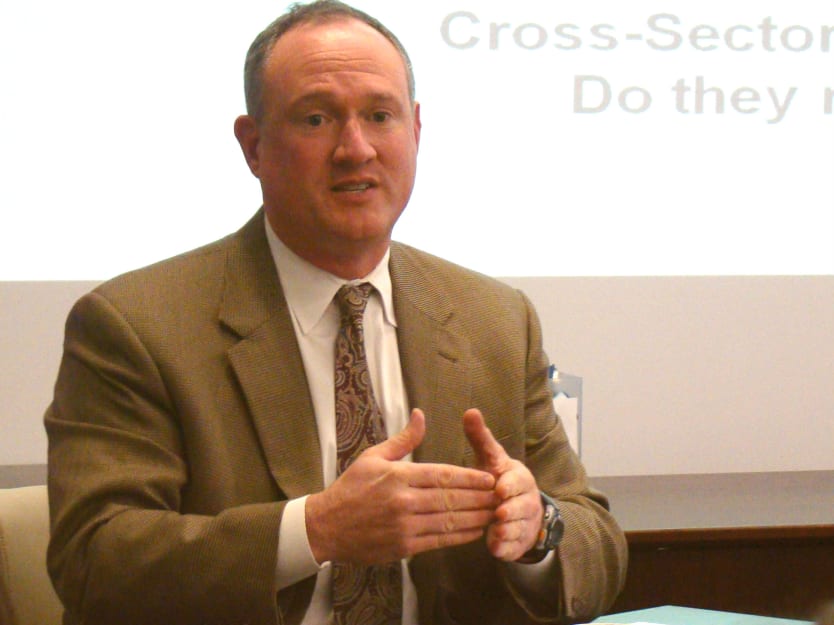
This article is produced and published by Devex Impact, a global initiative of Devex and USAID, that focuses on the intersection of business and global development and connects companies, organizations and professionals to the practical information they need to make an impact.
We all work in development, but I think a lot of what we do is not development but foreign aid: We’re helping a lot of people, which is great, but not developing much of anything. If we take this work seriously, and we want to create something that has long-term impact, with or without donor funding, then we have to engage the private sector as an essential partner.
Through my work on a number of global health public-private partnerships, I’ve come to see that the private sector is a critical but often misused and misengaged partner. Private-sector companies have more to offer than what we in development ask of them.
We usually approach the private sector with the attitude of, “Give us your money and we’ll do good things.” But when we engage them only with requests to “fund this” or “sit on this board,” it sends the message that we don’t really want their involvement. In fact, the private sector has far more to offer the development world, and as donors, NGOs and implementers, we need to a better job engaging them as true partners in development.
The private sector is all about development and creating local capacity, economic growth and long-term viability of their operations and markets. They are well positioned to partner with the public sector and development community in strategic planning, education and promotion, distribution, product development and marketing, training and capacity building. They are also capable of serving significant segments of target populations with low-cost, high quality health products and services, thereby reducing the burden of the public sector so that they can better focus limited resources on the most needy and vulnerable.
Public-private partnerships are like a lot of marriages: great for the first six months or a year, and then it can get rough quickly. I think the divorce rate for these partnerships is higher than we realize. One of the reasons for this is that the partners often don’t share a common understanding of the end-game.
For donors, NGOs and implementers there are a number of reasons we may seek out the private sector in the first place. It could be because it’s sexy, or our boss is telling us to do it, or we have a group designed to do partnerships, and we have to do something. Or it could be the realization that we don’t have all the resources we need, and we think that by bringing in the private sector, we can increase resources and have a larger impact.
On the private sector side, the motivations depend on who you engage. There are the business leaders, the sustainability people, the foundation people, the corporate affairs people, and they all have different perspectives. Some private sector actors may be interested in partnership so they can check the CSR box, or get good PR, or, in some cases because they believe it’s the right thing to do.
There’s nothing wrong with those motivations, but the best motivation is when a partnership helps a company’s bottom line and fits into their business model. That’s when the private sector is willing to invest significant resources and it becomes more than just writing a check and adding a bullet point to the annual report.
When development professionals approach the private sector, we need to take this as a starting point: that the most successful and sustainable partnerships make a difference in the company’s bottom line.
Whether through profits from expanding markets, the positive impact of cause-related marketing, or even the fact that engaging in development is a great way to attract, motivate and retain top talent, there have to be tangible benefits. How can we engage companies to “do well by doing good? We need to identify opportunities where a positive and sustainable development outcome is good business, and it often is.
All parties need to understand what they’ll get out of it, and what success – and failure – will look like.
One stumbling block for many partnerships is that the public sector and private sector have different time frames. The public sector has to show success quickly in order to get that next tranche of money from Congress. For example, a donor may want to see a 50% increase in contraceptive prevalence in the next four years, and if it doesn’t happen, then the program is discontinued. Is this reasonable and something that a successful commercial player would sign up for?
Donors need to be more focused on long-term impact and, therefore, less influenced by political pressures. When they focus exclusively on short-term impact, it distorts decision making. I’ve seen this up close: Where a donor wants to scale up rapidly and expand to multiple countries, while the private-sector partner wants to step back and conduct market research first. Unrealistic expectations driven by donors can lead to disillusionment, frustration and the collapse of partnerships. In this case, donors would be wise to work with the private sector to determine how, through joint investment, the risk of market entry could be reduced and the path to sustainable markets could be expedited.
The private sector tends to think more long-term. Companies are often willing to break-even in the short term if there is a long-term possibility for real growth. For example, for a company like Coca-Cola, one of the most successful marketing organizations in the world, it would be a huge success in some countries to increase market-share by just 5% over five years. For them, that’s meaningful growth.
Planning for the long-term means being realistic about the donor’s exit strategy. I’ve seen donors who think: “Let’s engage a private sector company to supply a commodity at a low-price, which we will market and distribute. When our money runs out, they will take it over.” It never actually works that way. When they get to the end of the project, the private sector company will say: “We don’t like your branding, your price strategy doesn’t work, and unless you subsidize this product, we won’t produce it.” In other words, the public-sector rushed to market without letting the private sector company think through a strategy that really worked for them. There needs to be a much more gradual transition, with the private sector having ownership over the business aspects of the partnership from the get-go.
In spite of these pitfalls, I am still passionate about public-private partnerships, because I think there is so much potential for development impact when we do them right. If we in the development community can approach companies early in our planning processes, engage them throughout the partnership and have realistic goals for success, we are all much more likely to succeed in creating real and lasting impact among the people we are all committed to helping improve their lives.
Join the 500,000-strong Devex community to network with peers, discover talent and forge new partnerships – it’s free! Then sign up for the Devex Impact newsletter to receive cutting-edge news and analysis every month on the intersection of business and development.








